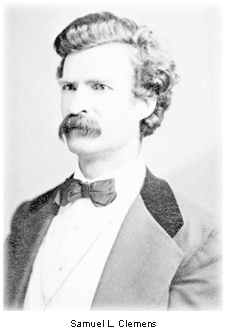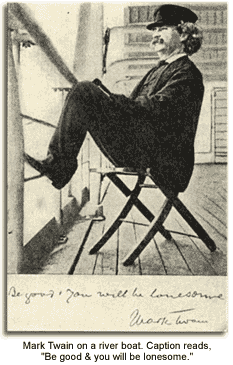Samuel Clemens (Mark Twain) is considered to be one of America’s greatest humorists and writers. He is perhaps best known for his novels about boyhood life on the Mississippi River in the mid-19th Century: The Adventures of Huckleberry Finn, considered to be Twain's greatest contribution to American literature, and The Adventures of Tom Sawyer, both of which were based in part on his adventures as a child along the banks of the Mississippi.
 Under the pen name Mark Twain, Clemens published more than 30 works of literature that included satire, historical fiction, short stories, and nonfiction. Many of his books, including Huckleberry Finn, Tom Sawyer, The Prince and the Pauper, and A Connecticut Yankee in King Arthur's Court have become classics.
Under the pen name Mark Twain, Clemens published more than 30 works of literature that included satire, historical fiction, short stories, and nonfiction. Many of his books, including Huckleberry Finn, Tom Sawyer, The Prince and the Pauper, and A Connecticut Yankee in King Arthur's Court have become classics.
In addition to those well-known works, Twain also wrote five travelogues that detailed his experiences in the Western U.S., Europe, the Middle East, Asia, and along the Mississippi, such lesser-known writings as “The Personal Recollections of Joan of Arc," and “Letters from the Earth,” in which he presents himself as the Father of History. Father History reviews and interprets events from the Garden of Eden through the Fall and the Flood, translating the papers of Adam and his descendants.
Childhood and Early Occupations
Samuel Langhorne Clemens was born the sixth of seven children in the small village of Florida, Missouri, on November 30th, 1835. His parents, John Marshall Clemens and Jane Lampton Clemens, were married in Kentucky and made their way through Tennessee to Missouri. His father moved the family to Hannibal, when Samuel was four. He spent a large part of his boyhood on the west bank of the Mississippi River.
Like numerous authors of his day, Sam had little formal training. His education was earned in the print shops and newspaper offices where he worked as a youth. By the time he was 18, Sam had served an apprenticeship as a printer at his brother Orion’s paper and written a humorous sketch, The Dandy Frightening the Squatter, which was published in The Carpet Bag, a New York periodical.
From 1853 to 1862, he continued to work as a humor writer under such pseudonyms as Thomas Jefferson Snodgrass, W. Epaminandos Adrastus Blab, Sergeant Fathom, and Josh.
In 1853, Clemens decided to leave Hannibal and travel. During a visit to New Orleans, Louisiana, he persuaded a riverboat captain to teach him his skills. By the spring of 1859, Clemens was a licensed riverboat pilot. He might have remained a pilot if it had not been for the Civil War, which closed the river for a time.
After being part of the Confederate Army for just two weeks, he resigned (as he referred to his desertion) and traveled to Nevada with his brother, an abolitionist whom President Lincoln had appointed as secretary to the territorial governor. Much like his father, Clemens was prone to dreaming up grandiose schemes for making money, and elected to search the west for silver as war raged in the East.
Clemens' career as a prospector and miner was a failure, and he fell back on journalism to make a living. In 1862 he went to work with the Virginia City Territorial Enterprise, where his abilities as a reporter and humorist became evident. In February 1863, he adopted the nom de plume “Mark Twain,” which is a riverboat term meaning “two fathoms deep.” The new name seemed to free Clemens, and from that time on, he was committed to the art of professional humor.
Duel and Feud
More than once, Twain’s sharp wit enmeshed him in a duel of words that threatened to turn physical. He was forced to leave Virginia City after a conflict with a rival journalist and settled in {2437:San Francisco] only to have his repeated assaults on the city government involve him in a feud with the police force.
As a result, he was forced to flee to a friend's cabin in Angels Camp, Tuolumne County. It was in that area of played-out mines inhabited by played-out prospectors that Twain heard the tale of the jumping frog, which became the basis for his humorous short story "The Celebrated Jumping Frog of Calaveras County." After that piece was published in the Saturday press in the fall of 1865, Twain won the fame in the East that he had sought for so long.
Publication of the Jumping Frog seemed to turn things around for Twain, and his career as a humorist was underway. He not only wrote humorous short stories for magazines and newspapers, but also took an assignment in Hawaii in 1866, as a travel correspondent for the Sacramento Union. On his return from Hawaii, Twain made his debut as a lecturer, including in his first brief tour a triumphant return to Virginia City. He then left the West, never to return.
 Fame and Fortune
Fame and Fortune
In 1869, Twain’s notes of his 1867 pleasure trip to the Holy Land aboard the Quaker City, brought him the fame and fortune that had eluded him as a miner. The record of that trip was first written as dispatches to the San Francisco Alta California, and then rewritten as The Innocents Abroad.
In 1870, Twain married Olivia Langdon of Elmira, New York, after winning her over with hundreds of love letters. The young couple first lived in Buffalo, New York, and then, in an effort to be closer to his publisher, Twain and his wife moved to Hartford, Connecticut. It was in Hartford that he wrote his masterpiece, Tom Sawyer.
The Twains had four children: Langdon, Susy, Clara, and Jean. Langdon died of diphtheria in 1872. The other children were born between 1872 and 1880. During that period, he lectured often in the United States and England.
In 1873, Twain's writings turned toward social criticism. He and Hartford Courant publisher Charles Dudley Warner co-wrote The Gilded Age, a novel that attacked political corruption, big business and the American obsession with getting rich that seemed to dominate the era.
From 1874 to 1891, Twain and his family lived in Hartford. During those years, Twain completed some of his most famous works. Such novels as Tom Sawyer, published in 1876, and Life on the Mississippi, published in 1883, captured his memories of Missouri and American life at that time.
Turning his focus to social commentary, Twain wrote The Prince and the Pauper in 1881 and A Connecticut Yankee in King Arthur's Court in 1889, both of which explored class relations and leveled criticism at oppression in general, as well as the period's technological explosion.
In Huckleberry Finn, Twain satirized slavery and spoke strongly against the continued poor treatment of black Americans overall. In 1885, he contracted with Ulysses S. Grant to publish the latter's memoirs; the two-volume set provided large royalties for Grant's widow and was a financial success for Twain as well.
In Debt
Although Twain enjoyed financial comfort during his years in Hartford, he made bad investments in new inventions, and was forced into bankruptcy. In an effort to save money and pay off their debts, Twain moved his family to Europe in 1891. When his publishing company failed in 1894, Twain was forced to set out on a worldwide lecture tour to earn money.
Tragedy struck in 1896 when Twain’s daughter, Susy, died from meningitis at the age of 24, in their Hartford home. Unable to return to the place of her death, the Twains never went back to Hartford to live.
From 1891 until 1900, Twain and his family traveled throughout the world. In 1897, he wrote Following the Equator, which told of European powers' exploitation of weaker governments, which he witnessed during their travels.
The Boer War in South Africa and the Boxer Rebellion in China added to his growing anger toward imperialistic countries and their actions. With the advent of the Spanish-American and Philippines War in 1898, Twain's anger was redirected toward the American government.
 By the time Twain returned to the U.S. from Europe and paid off his debts, he had become America’s foremost celebrity. He was invited to attend ship launchings, anniversary gatherings, political conventions, and countless dinners. Reporters met him at every port of call, anxious to print a new quote from the famous humorist.
By the time Twain returned to the U.S. from Europe and paid off his debts, he had become America’s foremost celebrity. He was invited to attend ship launchings, anniversary gatherings, political conventions, and countless dinners. Reporters met him at every port of call, anxious to print a new quote from the famous humorist.
To enhance his image, he took to wearing white suits and loved to stroll down the street to attract attention. It was at that time that Twain declared himself an anti-imperialist and, from 1901 until his death in 1910, served as the vice president of the Anti-Imperialist League.
Later Years
In his later years, Twain’s writings turned dark. They began to focus on human greed and cruelty, and question the humanity of the human race. Even though Twain's lecture tour had managed to get him out of debt, his anti-government writings and speeches threatened his livelihood once again.
Labeled by some as a traitor, several of Twain’s works were not published during his lifetime, owing to the fact that magazines would not accept them, and perhaps because of a fear on his part that his marketable reputation would be ruined.
In 1903, Olivia became ill. She and her husband returned to Italy, where she died a year later. As he approached the end of his life, Twain grew lonely and depressed. He hired a biographer, a personal assistant, and adopted several surrogate grandchildren.
He traveled to Bermuda for health and relaxation and could be found playing billiards with friends. His last home was a house he built in Redding, Connecticut, that he named “Stormfield,” after one of his characters who makes a trip to heaven.
When he died on April 21, 1910, newspapers around the country declared, “The whole world is mourning.”